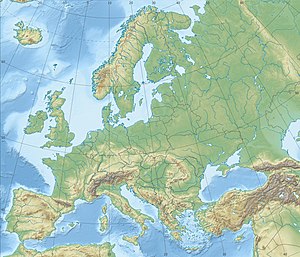| Battle of Borodino | |||||||||
|---|---|---|---|---|---|---|---|---|---|
| Part of the French invasion of Russia | |||||||||
 Battle of Moscow, 7th September 1812 (painting by Louis-François Lejeune, 1822) | |||||||||
| |||||||||
| Belligerents | |||||||||
|
| |||||||||
| Commanders and leaders | |||||||||
| Strength | |||||||||
|
103,000–135,000[1] …see § Opposing forces |
125,000–160,000[1] …see § Opposing forces | ||||||||
| Casualties and losses | |||||||||
|
28,000–35,000 killed, wounded or captured[2][3][4][a] 50 generals[b] …see § Casualties |
40,000–53,000 killed, wounded or captured[c][3][2][d][13] 27 generals[e] …see § Casualties | ||||||||
Location within Europe | |||||||||
The Battle of Borodino (French: bataille de la Moskova - "Battle of Moscow"; Russian pronunciation: [bərədʲɪˈno])[f] took place near the village of Borodino on 7 September [O.S. 26 August] 1812[14] during Napoleon's invasion of Russia. The Grande Armée won the battle against the Imperial Russian Army, but failed to gain a decisive victory and suffered tremendous losses. Napoleon fought against General Mikhail Kutuzov, whom the Emperor Alexander I of Russia had appointed to replace Barclay de Tolly on 29 August [O.S. 17 August] 1812 after the Battle of Smolensk. After the Battle of Borodino, Napoleon remained on the battlefield with his army; the Imperial Russian forces retreated in an orderly fashion southwards. Because the Imperial Russian army had weakened the Grande Armée, they allowed the French occupation of Moscow, using scorched earth tactics on their own population to trap Napoleon and his men with their own largest city.[15] The failure of the Grande Armée to completely destroy the Imperial Russian army, and in particular Napoleon's reluctance to deploy his Imperial Guard due to Napoleon's wishes to negotiate with Alexander to make him join against the British, has been widely criticised [citation needed] by historians as a large blunder, as it allowed the Imperial Russian army to continue its retreat into territory increasingly hostile to the French.
Approximately a quarter of a million soldiers were involved in the battle, and it was the bloodiest single day of the Napoleonic Wars. Napoleon himself summed up the battle and its ambiguous outcome, writing, "The French showed themselves worthy of victory and the Russians of being invincible."[16]
- ^ a b Dwyer 2014, p. 383.
- ^ a b Riehn 1990, p. 255.
- ^ a b c Zamoyski 2004, p. 287.
- ^ Mikaberidze 2007, p. 209.
- ^ a b Troitsky 2024.
- ^ Vasilyev 1992, p. 69.
- ^ Vasilyev 1992, pp. 69, 71.
- ^ Vasilyev 1992, p. 71.
- ^ Kazantsev 1999; Vasilyev 1992, p. 69.
- ^ Zemtsov 2001, pp. 260–265.
- ^ a b Егоршина 2023, p. 273.
- ^ a b Lvov.
- ^ a b Shvedov.
- ^ Kuehn 2008.
- ^ Riehn 1990, p. 253.
- ^ Roger Parkinson, The Fox of the North, p. 157 (New York, David McKay Co., 1976).
Cite error: There are <ref group=lower-alpha> tags or {{efn}} templates on this page, but the references will not show without a {{reflist|group=lower-alpha}} template or {{notelist}} template (see the help page).

